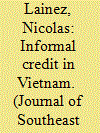|
|
|
Sort Order |
|
|
|
Items / Page
|
|
|
|
|
|
|
| Srl | Item |
| 1 |
ID:
130057


|
|
|
|
|
| Publication |
2014.
|
| Summary/Abstract |
The state of knowledge about finance and credit in Vietnam remains fragmentary despite
the interest that economists have shown in the topic over the past fifteen years. This paper explores why informal finance continues to enjoy great popularity among rural households despite its high price and risks in Southern Vietnam. This research note examines in detail three modes of credit, and shows that borrowers' perception of informal credit does not always correspond to that of government financial and international institutions. The social dimension of informal finance is crucial to understanding its prevalence, adaptability and continuity in Vietnam. From the point of view of the borrowers, informal credit is not perceived as an evil but rather an economic necessity.
|
|
|
|
|
|
|
|
|
|
|
|
|
|
|
|
| 2 |
ID:
086314


|
|
|
|
|
| Publication |
2009.
|
| Summary/Abstract |
China's war on terrorism is among its most prominent and least understood of campaigns. An indigenous insurgency with links to the global jihad has threatened the government's grip on a massive region of northwestern China known as Xinjiang. Riots, bombings, ambushes, and assassinations have rocked the region under separatist and Islamist banners. China acted early and forcefully, and, although initially brutal, their efforts represent one of the few successes in the global struggle against Islamist terrorism. China's campaign, which has reshaped local society and government institutions, has been so effective that scholars and statesmen now debate whether China genuinely confronts a terrorist threat from Xinjiang.
|
|
|
|
|
|
|
|
|
|
|
|
|
|
|
|
| 3 |
ID:
121411


|
|
|
|
|
| Publication |
2013.
|
| Summary/Abstract |
In the period after 1999, the international community abrogated Serbia's sovereignty over Kosovo. It took responsibility for governing Kosovo and actively supported the development of autonomous Kosovar government institutions. Simultaneously, the Serbian authorities immediately started to rebuild Serbian government institutions in the parts of Kosovo that hosted a Serbian majority population. This article analyzes how this situation of parallel governance affects ethnic boundary strategies in the village of Gracanica, the largest Serbian village in central Kosovo. The article is based on evidence collected during fieldwork in Gracanica one year after Kosovo's declaration of independence in 2008. In this period, the Kosovar government implemented a decentralization program, which would transform Gracanica into a Serb majority municipality. Using Andreas Wimmer's multilevel process theory on boundary making, the article argues that in the period studied, "the scripts of action" concerning how to deal with the Kosovar government do slowly change, but this is largely a pragmatic response and Kosovo Serbs still identify themselves with Serbia. Important explanatory factors for these changing local dynamics are the changes in institutional structures (less Belgrade, more Pristina), the changes in (the balance of) resources offered by either government at the local level, the characteristics of the local political networks, and the weakness of local leadership.
|
|
|
|
|
|
|
|
|
|
|
|
|
|
|
|
| 4 |
ID:
092130


|
|
|
|
|
| Publication |
2009.
|
| Summary/Abstract |
Local peace initiatives have been introduced in post-conflict settings in aid of statebuilding processes. However, contradictions in such efforts that undermine the state become apparent in a development context when government institutions are, generally, functioning. Peacebuilding initiatives in the arid lands of Kenya are a good example of this. While they have proved successful in resolving conflicts at the local level, they challenge the state structure in three ways. First, some of their features run counter to the official laws of Kenya and jeopardize the separation of powers. Second, they pose a dilemma, since their success and legitimacy are based on grassroots leadership and local concepts of justice. Both can be at odds with democratic decision-making, inclusiveness and gender equity. Third, they provide yet another tool for abuse by politicians and other local leaders. This reveals a dilemma: aspects of peacebuilding can actually undermine a statebuilding endeavour.
|
|
|
|
|
|
|
|
|
|
|
|
|
|
|
|
|
|
|
|
|